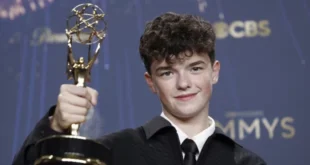The film world is mourning the loss of Robert Redford, the acclaimed American actor, director, and activist, who has died at the age of 89. His passing was confirmed by his publicist, Cindi Berger of Rogers & Cowan PMK, who said the legendary star died peacefully in his sleep. While no specific cause of death has been disclosed, tributes are already pouring in for a man whose career spanned more than six decades.
A Storied Career on Screen and Behind the Camera
Redford became one of the defining faces of American cinema in the late 20th century, with his breakout role opposite Paul Newman in Butch Cassidy and the Sundance Kid (1969) instantly propelling him into stardom. He and Newman later reunited in The Sting (1973), another classic that cemented Redford’s reputation as a charismatic leading man.
His filmography reads like a catalogue of American cinema highlights: The Candidate, All the President’s Men, Three Days of the Condor, The Natural, and Out of Africa all showcased his versatility and star power.
Despite never winning an Oscar for acting, Redford achieved critical success as a filmmaker. His directorial debut, Ordinary People (1980), won both Best Picture and Best Director at the Academy Awards. He later directed A River Runs Through It, Quiz Show, and The Horse Whisperer, further cementing his reputation as a skilled storyteller behind the camera. In 2002, he was honored with an Academy Award for Lifetime Achievement.
Champion of Independent Cinema
Beyond Hollywood blockbusters, Redford left a lasting legacy by creating opportunities for smaller, riskier films to thrive. In the 1970s, he founded the Sundance Institute and the Sundance Film Festival in Utah, which grew into the premier showcase for independent filmmakers worldwide. The platform gave rise to countless careers and helped redefine the industry’s relationship with indie cinema.
“Some people have analysis. I have Utah,” Redford once said, underscoring how his adopted home state became both his sanctuary and the hub for his creative vision.
A Private Man with a Public Voice
Though one of the world’s most recognizable actors, Redford fiercely guarded his private life. He purchased land in remote Utah in the 1970s, retreating there with his family to escape the glare of celebrity.
He was married twice—first to historian Lola Van Wagenen, with whom he had four children, before their divorce in 1985. In 2009, he wed German artist Sibylle Szaggars, his longtime partner.
While never seeking public office, Redford was outspoken on environmental issues and social justice. He supported organizations such as the Natural Resources Defense Council and the National Wildlife Federation, using his fame to amplify causes close to his heart. Politically, he often leaned progressive; in a 2017 interview, during Donald Trump’s presidency, he described politics as being “in a very dark place” and bluntly suggested Trump should “quit for our benefit.”
From Aspiring Painter to Hollywood Legend
Born Charles Robert Redford Jr. in Santa Monica, California, on August 18, 1937, he grew up in what he described as a “lower-working-class” family. Originally more interested in art than acting, he studied painting in Europe and New York before stumbling into drama school. What began as a flirtation with set design turned into a life-changing acting career.
By the late 1950s, Redford was working steadily on Broadway and television. His feature debut came in Warhunt (1962), and just a few years later, he won wide acclaim in Barefoot in the Park (1967) opposite Jane Fonda. Turning down The Graduate—a role that went to Dustin Hoffman—proved no setback, as Butch Cassidy and the Sundance Kid would soon make him a household name.
The 1970s brought more iconic roles in The Way We Were and The Great Gatsby, while the 1980s and beyond saw him dedicate more energy to directing and producing. Even into his later years, he remained active, reuniting with Jane Fonda in Netflix’s Our Souls at Night (2017), a poignant drama he described as one of his final acting performances.
A Legacy That Transcends Film
Robert Redford’s impact stretched far beyond the screen. He redefined what it meant to be a Hollywood star—balancing mainstream success with a commitment to artistic independence, environmental advocacy, and social engagement.
As the tributes roll in, one thing is clear: Redford was not just an actor or filmmaker, but a cultural figure whose influence helped shape modern American cinema. His legacy will endure through his films, the Sundance Festival, and the generations of artists he inspired.
 The Daily Star Ireland
The Daily Star Ireland


